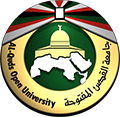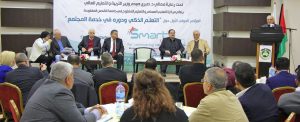Under the auspices of H.E. Dr. Sabri Sedam, the Minister of Education and Higher Education, Continuing Education and Community Service Center and Open Learning Center organized the first international conference on Smart Learning for Community Development on 20th of Mar, 2017 at Red Crescent Society in Bireh. .
The conference started with opening speeches by Eng. Adnan Samarah, the Chairman of Board of Trustees, Prof. Younes Amr, the President of the University, and Prof. Sameer El-Najdi, the Head of the Preparatory Committee and the Vice President for Academic Affairs.
The Director of Media Unit, Mr. Abdelqader El-Darweesh was appointed as the Master of the Conference. He initiated the launch of the conference along with Dr. Sabri Saidam who praised the resilience of Palestinians and their strive for education and life. He praised the efforts of QOU in the field of education, especially in smart learning and open learning. He also added that education plays a vital role in the Palestinian society and acts as a weapon to fight Israeli occupation and build an independent state. He stated that the conference will present success stories on utilizing smart learning, and stressed that the Ministry of Education encourages using technology in education starting from the 6th grades at schools.
During the conference, Eng. Samarah’s speech stated that the University was established to offer education to Palestinians under dire political situations and succeeded in its mission to become a leading educational institution in the field of smart learning and e-learning, pointing to the conference as an indication the University’s aim to develop its technology to offer the best education for Palestinians. He then called upon researchers to publish their research papers in international journals.
Prof. Younes Amr ,in his speech , welcomed the guests, stating that in today’s world, means of education are many and QOU has started using a new tool of education which is smart learning and smart devices to offer flexible education to its students. He continued, “Technology and smart devices play a major role in education beating conventional methods of teaching and dictation.” However, he also pointed to the downsides of complete dependence on technology and using writing software. For example, children are now developing a weakness in using traditional methods of writing using a pen and in syntax. He encouraged the educational institutions to use both methods.
Prof. El-Najdi explained in his speech the reason behind holding the conference, stating that in today’s world smart technology is used in education. During the sessions of the conference he shed the light on the national regulating policies and strategies for using smart learning and digitalizing learning. He also tackled the topic of smart learning environment’s role in addressing the needs of students who live in marginalized areas. He also explained about the optimal use of technology in education.
Prof. El-Najdi stated that 46 research papers were accepted and they were submitted by 4 Arabic countries and 6 other countries from the international community. He added that the scientific committee which refereed the papers consisted of 33 scholars who chose 12 papers to be presented at the sessions of the conference. He added that following the conference, two workshops will take a place which will include a number of international researchers who will participate in the conference. The first workshop will address using technology in education utilizing Mobile devices and it will be held under the supervision of Prof. John Traxler, in cooperation with PICTI. The second workshop will address the topic of scientific research in Europe chaired by Dr. Maria Fragkaki from King’s College London. Both students and Faculty Staff can attend the workshops.
The conference had two main speakers, Prof. John Traxler, an expert in Mobile learning at University of Wolverhampton, Prof. Abdelfdil Bennani, the Honorary Chairman of E-Omed.
The first session was on the policies and strategies of smart learning, headed by Dr. Mamoun Jaber from the Ministry of Education and Higher Education. The session included topics presented by international and local speakers; Dr. Maria Fragkaki from King’s College London addressed the topic of smart learning in the Middle East, India, UK, and Europe; Mr. Zaher Atwa from the Ministry of Education and Higher Education along with Mr. Mohamad Husni, Mr. Rosni Deen, from the Universiti Kebangsaan Malaysia, addressed the topic of the effects of flipped learning in developing the critical thinking of high school students; Dr. Nael Ahmad from Hebron University talked about capacity building of faculty staff at the universities within the context of e-learning environment and he mentioned the experience of the Excellence Center at Hebron University in this field; Dr. Olena Soloviova from the National University of Life and Environmental Sciences talked about Ukraine’s distance education experience; Dr. Takis Politis from the University of Thessaly talked about the use of MOOC at the secondary education level in Greece; and Dr. Haifa Adnan Hasouneh and Dr. Rafat Ahmad El-Ewadi talked about a proposed strategy to support faculty staff working at Palestinian universities for fulfilling smart learning requirements and digitalized national values.
The second session was on the environment of smart learning and the employment of learning tools, headed by Dr. Ali Shaqour from An-Najah University. The session included topics presented by international and local speakers; Dr. Randa El-Najdi from QOU talked about remedial math and life QOU MOOC course; Dr. Fuad A. Trayek from the Islamic University of Malaysia talked about technology ethics and religious orientation and mentioned a study on undergraduate students at the University of Malaysia; Mr. Baha Thabet, Ms. Siba Farhana, and Ms. Ghadeer Hamed from QOU talked about sLOOC as a source of education and community development; Ms. Siba Farhana also talked about social media and its role in developing students’ experience and presented the course of Jerusalem History as a case study; Dr. Anwar Shehadeh Nassar from QOU talked about using smart learning in addressing the needs of students with special needs; finally, Dr. Ahmad El-Kahlout and Mr. Samer Mohamad El-Maqyad from QOU talked about the requirements for employing smart learning in education.
The Third Session consisted of success stories, headed by Dr. Rasheed El-Jayouse, the Dean of e-learning at QOU. The session included topics presented by international and local speakers; Dr. safa El-Karaky Dwaik from Ramallah Municipality talked about developing schools that are featured with smart teaching practices in Ramallah City; Mr. Talib Alhaj and Ms. Maha Asraf from Ministry of Education and Higher Education talked about digitizing Palestinian schools; Mr. Mohamad Abu Mouleq from QOU talked about Mobile Learning for developing 21st century skills in the Palestinian schools; Ms. Ghadeer Hameed from QOU talked about OLC experience in developing educational games; Mr. Ahmad El-Meny and Dr. Steve McCrea along with Dr. Mario Llorente J. Leyva from US talked about enhancing smart learning with the postman questions.

